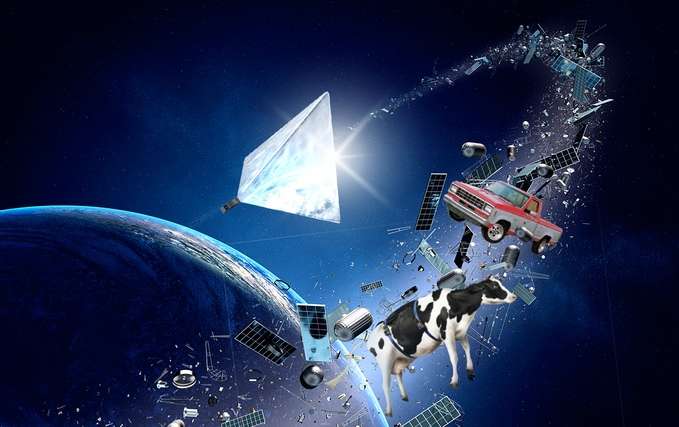April 5, 2016 weblog
Russian team attempts crowdfunding for space junk solution

Space junk is as bothersome as it sounds. "Space exploration hasn't been on for long, but humanity has already managed to turn near-Earth space into a miniature junk yard for satellites," said a Russian team. These days, they said, scientists of all nations are looking for space debris solutions.
The team said the problem of space debris was "very serious. If nothing changes, space flights may become virtually impossible within 30 years."
In an email exchange with Sputnik, project leader Alexander Shaenko said, "Decommissioned satellites could take decades to descend from an altitude of 600-800 kilometers."
The group is doing something about it—without props of large corporations, the military and state assistance, they said. Deep pockets are not required, only focus, commitment and popular support—that is their conviction moving forward.
Using the Moscow State University of Mechanical Engineering (MAMI) as their starting point, they set out to create a solution in 2014 and have been working at it ever since. Their solution is called Mayak ("beacon"), a satellite to behave as an artificial star, so to speak, with a reflective sheet of material. The "star" will set out to free us from space debris. They want to launch it in 2016.
"Our satellite will be used to test an aerodynamic braking system that will enable thrusterless de-orbiting of space objects. This will help to clear the orbit of debris."
When the satellite reaches the orbit, they said, it will extend the solar reflector shaped like a pyramid. The faces of the pyramid are made of air-thin film which is 20 times thinner than human hair.
A parachute-like structure is designed to lower the orbits of debris so they can burn up in Earth's atmosphere, said Ellie Zolfagharifard and Abigail Beall in the Daily Mail.
A clear picture of the concept is provided by Duncan Geere in TechRadar. He wrote that the project leaders announced that Mayak will carry a prototype of an aerobraking system to help address space junk. "Mayak will test an aerodynamic system that could allow space objects to slow themselves down without thrusters - enough to cause them to fall back to Earth and burn up in the atmosphere. It'll also lower the satellite's orbital time from a year to just a month."
The Mayak team told TechRadar that it also wants "to explore Earth's upper atmosphere density and verify algorithms for calculations of apparent magnitude of space objects and satellites."
The group has turned to crowdfunding, hoping they will attract backers to help them light up their "star." Backers, they said, could use a mobile app that will show details of the satellite's design and development, "and when it's time – it'll point you to the satellite in the night sky!"
Sputnik talked about the significance of this project, saying it will be Russia's first crowdfunded satellite.
Also, said the report, the new satellite would be the brightest low earth orbit object in space. People around the world would see a flashing beacon in the night sky. The Mayak site mentioned observation about the density of the outermost layers of the atmosphere. The capsule will be descending faster where density is higher, and slower where air is thinner, according to the site.
It will be launched from a Soyuz 2 rocket with help from Roscosmos, the Russian space agency, reports say, in 2016. Turning to Kickstarter to get the project started, they want to raise $45,000. They seek funding to finish all the tests, to produce the satellite, and launch it.
Pledge amounts and their associated details sweep across a very wide price range, from $7 dollars to $8,999 (For the latter, they have this description: "Ready. Set. Baikonur! The biggest reward you can get. The most wonderful thing, you can only imagine. Only for you, we will take out 'im' from 'impossible'. We will take you for the tour of your life – straight to our Baikonur Spaceport, where you will become the life spectator of the great launch of our satellite. Plus, as a sponsor – you'll also get your personal access to the Mayak App!")
More information: www.kickstarter.com/projects/1 … e-earth-from-space-d
© 2016 Tech Xplore














